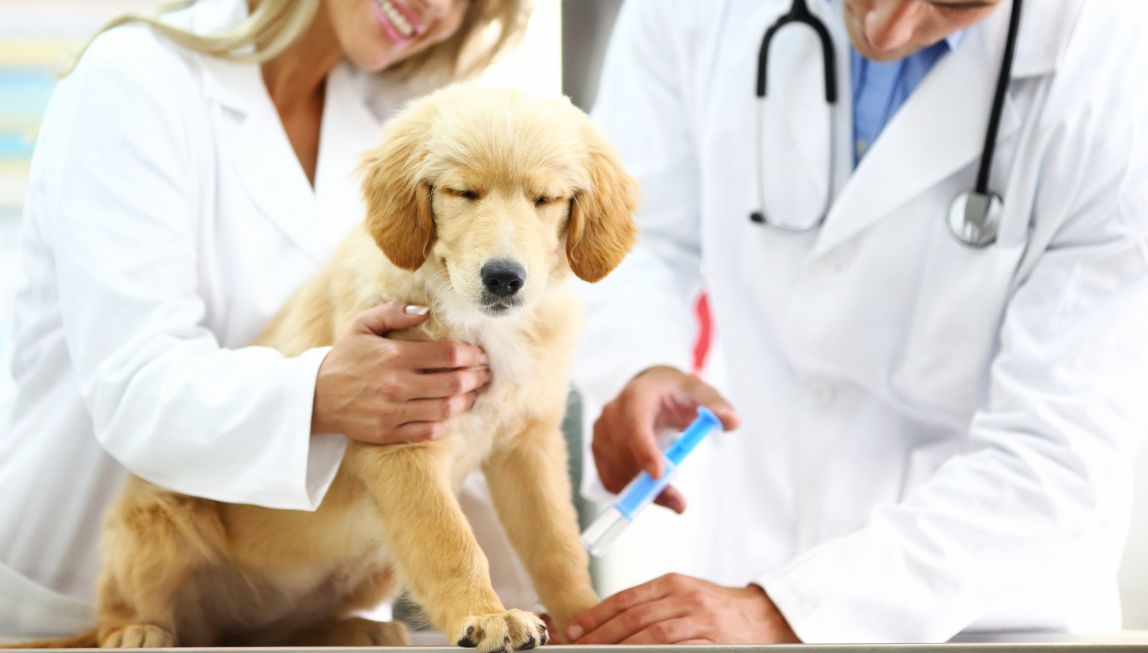Pet Vaccines: What You Need to Know

Most pet parents know that their dog or cat needs shots of some type, but few really understand what that means. Do you know what dog vaccines or cat vaccines your pet is due for and why they are important? MarketPlace Veterinary Hospital is here to break down for you.
More Than A Shot
Some of the diseases that we administer pet vaccinations against can be quite serious or even deadly. Others are just downright annoying and inconvenient.
When an animal gets a “shot,” we are administering a dose of something designed to help prepare the body’s immune system to fight off a certain virus or bacteria. The vaccination allows the production of disease-fighting antibodies in advance of actually meeting the disease. This makes a vaccinated pet much more equipped to fight off a disease if and when they are exposed.
Most vaccinations require an initial dose and then supplemented with a booster at varying intervals. Many of them require a booster about a month after the initial administration and eventually tapering down to an annual or longer basis thereafter.
Core Pet Vaccines
Not all pets need to get all vaccinations, but most pets need a small subset of vaccinations. These basic vaccines are called core vaccines, and they are typically a pretty important part of preventive pet care.
Core pet vaccines include:
- Rabies: The state of California requires all dogs over four months of age be vaccinated against rabies. It is also strongly recommended that all cats be vaccinated as well. Because rabies is a human health concern, we take this disease very seriously.
- Canine distemper combination vaccine: This vaccine protects dogs against several diseases including canine distemper, canine hepatitis, parainfluenza, and parvovirus. These highly contagious diseases are a serious concern for all dogs.
- Feline distemper combination vaccine: This vaccine protects cats against a few serious diseases including feline rhinotracheitis, calicivirus, and panleukopenia (feline distemper). Nearly all cats should receive this vaccine.
Dog Vaccines and Cat Vaccines You Might Hear About
There are other pet vaccines that we may recommend based on your pet’s individual risk factors. These might include age, socialization habits, or activities like boarding or hiking.
Non-core vaccinations that our veterinarians might recommend for your pet can include:
- Bordetella (Kennel cough): Kennel cough is a very contagious disease that causes an upper respiratory infection. Any pet who may be exposed to other pets such as at the groomer, boarding kennel, training classes, or dog park likely should be vaccinated.
- Leptospirosis: Dogs who contract leptospirosis experience serious kidney and liver failure. Lepto can also be transmitted to humans, making it important to vaccinate against. Dogs are exposed when encountering infected urine outdoors. Any pet who might share space with rodents or other wildlife needs to be vaccinated where possible.
- Lyme Disease: Dogs who have a high risk of exposure to ticks should be vaccinated against this tick-borne disease. Lyme disease can cause fever, joint pain, changes to the platelets, and even kidney trouble.
- Canine Influenza: Dog flu is a disease that can cause upper respiratory symptoms. While not usually fatal, it can cause serious disease.
- Feline Leukemia (FeLV): Feline leukemia is a serious and contagious disease of cats. Infected cats experience immunosuppression and tumor formation. Cats who go outdoors, live in households with other infected cats, or kittens are at highest risk.
Pet vaccinations are incredibly important when it comes to keeping our furry family members safe. In some cases, vaccination against certain diseases such as leptospirosis or rabies can help to keep your non-furry family safer, too.
Please contact us with any questions about what vaccinations your pet should receive and when. We are here to help.

